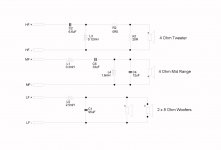Hi,
I have recently finished building a 3 way sealed box Hi Fi speaker, It sounds great.
Acoustically it measures ok,
Impedance measurements are ok (min 3.8 ohms).
Crossover is 2nd order throughout @ 480Hz and 4.2Khz
Box volume is 120 Litres
2 x 6.5 inch LF drivers (8 ohms each wired in parallel)
1 x 4" MF driver (8 Ohms)
1 x 3.4" HF driver (8 Ohms)
However when I try to take a DC Resistance reading the digital multimeter won't settle on a value. It ranges from 1 Ohm to 7 Ohms up and then back down again and carries on in this manner. Normally I would expect it to read around 4 ohms and does so on all other speakers with roughly the same impedance. Any ideas?
For the record I am aware of the difference between Impedance and DCR but I have never come across this one before. Any ideas why?
Thanks
I have recently finished building a 3 way sealed box Hi Fi speaker, It sounds great.
Acoustically it measures ok,
Impedance measurements are ok (min 3.8 ohms).
Crossover is 2nd order throughout @ 480Hz and 4.2Khz
Box volume is 120 Litres
2 x 6.5 inch LF drivers (8 ohms each wired in parallel)
1 x 4" MF driver (8 Ohms)
1 x 3.4" HF driver (8 Ohms)
However when I try to take a DC Resistance reading the digital multimeter won't settle on a value. It ranges from 1 Ohm to 7 Ohms up and then back down again and carries on in this manner. Normally I would expect it to read around 4 ohms and does so on all other speakers with roughly the same impedance. Any ideas?
For the record I am aware of the difference between Impedance and DCR but I have never come across this one before. Any ideas why?
Thanks
Most DMM's take their DCR reading @ 1Khz.
Well, that would be a problem with the meter design. Measuring impedance at any frequency other than 0 would not give you DCR. As far as I know, every DMM measures resistance with DC.
Sounds to me like the problem is the autorange function of the meter, if it has one. Flukes are famous for bouncing around in their reading until you force the meter to manual range mode. If your meter is not autoranging, then you may have to use a battery with a current limiting resistor to force a DC current through the coil, and measure DC millivolt drop across the coil to get a good resistance meaasurement.
This is quite common. Remember that the speaker is a microphone. WHen you measure DCR then you are only seeing the woofer. Now if there is any source of noise or vibration in the room, then the woofer will pick this up and feed it back into the DMM as a voltage. Depending on the internal impedance of he DMM this can cause very large swings in an impedance measurement. A cheap DMM will NOT reject this signal, while a better one will. A DMM is not a good way to measure DCR for this very reason.
- Status
- This old topic is closed. If you want to reopen this topic, contact a moderator using the "Report Post" button.
